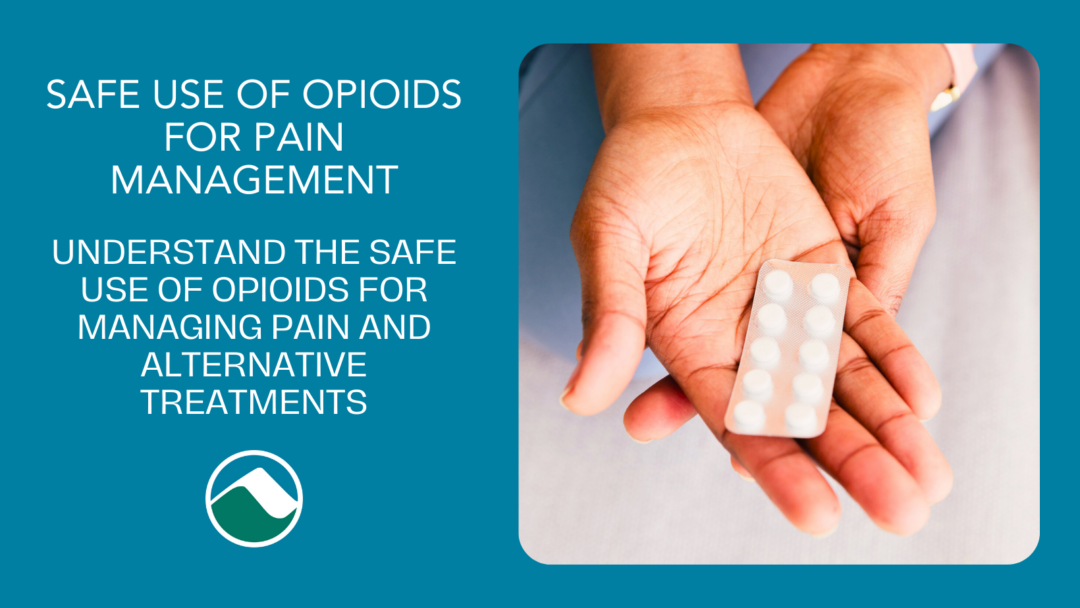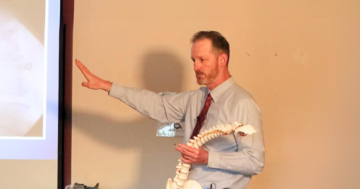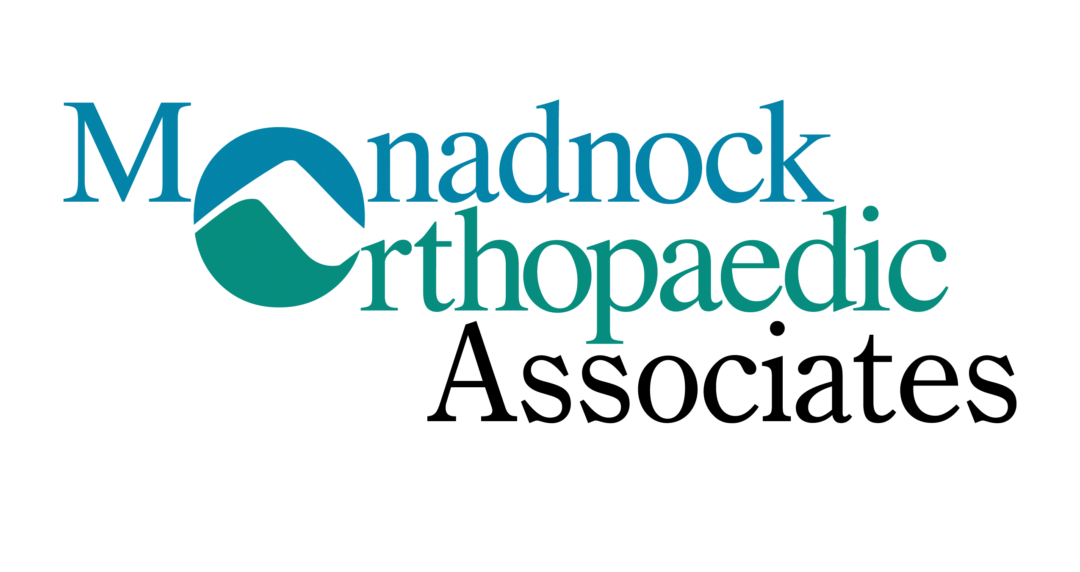Safe Use of Opioids for Pain Management

Understand the safe use of opioids for managing pain and alternative treatments

Opioids are powerful pain relievers often prescribed for managing severe pain. However, their use requires careful consideration due to the risk of dependence and side effects. This blog explores the role of opioids in pain management and highlights safer alternatives.
What Are Opioids?
Opioids are a class of drugs that include both prescription painkillers and illegal drugs. They work by binding to opioid receptors in the brain, reducing the perception of pain. Common prescription opioids include oxycodone, hydrocodone, and morphine.
When Are Opioids Prescribed?
Opioids are typically prescribed for acute pain following surgery or injury, or for chronic pain conditions that have not responded to other treatments. If and when opioids are used for chronic pain, there are associated risks, and patients require close monitoring and education to manage potential issues like addiction, tolerance, and side effects.
Safe Use Guidelines
- Follow Your Prescription: Always take opioids exactly as prescribed by your doctor.
- Monitor for Side Effects: Be aware of potential side effects such as drowsiness, nausea, and constipation.
- Avoid Alcohol: Do not mix opioids with alcohol or other substances that can increase the risk of overdose.
Alternatives to Opioids
- Over-the-Counter (OTC) Pain Relievers: Medications like acetaminophen and nonsteroidal anti-inflammatory drugs (NSAIDs), such as ibuprofen and aspirin, can effectively manage pain and are available without a prescription.
- Non-Opioid Prescription Medications: Several non-opioid prescription options are available for pain management, such as certain antidepressants, anticonvulsants (for nerve pain), and muscle relaxants. Consult your doctor to discuss which option is right for your specific pain needs.
- Physical Therapy: Engaging in physical therapy can help manage pain through targeted exercises and therapies.
- Mind-Body Techniques: Practices such as yoga, meditation, and acupuncture can provide relief and improve overall well-being.
While opioids can be effective for pain management, they should be used with caution. Explore alternative treatments and work closely with your healthcare provider to manage pain safely and effectively.
Seeking Help for Opioid Addiction
If you or a loved one are struggling with opioid addiction, it’s important to reach out to your doctor for guidance and support. You can also access valuable resources and support networks:
- Substance Abuse and Mental Health Services Administration (SAMHSA) National Helpline: 1-800-662-HELP (4357) or visit SAMHSA’s website.
- Shatterproof: A national nonprofit organization dedicated to reversing the addiction crisis. Learn more about resources and treatment at Shatterproof.org.
- Partnership to End Addiction: Call 1-855-378-4373 or visit drugfree.org for resources, helplines, and guidance on addiction recovery for you or your loved ones.
Why Choose Monadnock Orthopaedic Associates?
Our board-certified pain management specialists combine decades of experience with training from prestigious institutions like the Mayo Clinic. We offer comprehensive orthopedic care using advanced techniques and technology, all while providing personalized attention. At Monadnock Orthopaedic Associates, we’re committed to getting you back to pain-free living as quickly as possible with expert, compassionate care tailored to your unique needs. Choose us for expert care that’s close to home, where your well-being is our highest priority.
 Monadnock Orthopaedic Associates
Monadnock Orthopaedic Associates
Monadnock Community Hospital
Bond Wellness Center Suite 200
458 Old Street Road
Peterborough, NH 03458
Phone: 603-924-2144
Fax: 603-924-3993
Array
(
[section_title] =>
[section_text] =>
[posts_selection] => auto_taxonomy_terms
[section_posts] => Array
(
[0] => WP_Post Object
(
[ID] => 39214
[post_author] => 9192204
[post_date] => 2024-12-16 08:26:06
[post_date_gmt] => 2024-12-16 13:26:06
[post_content] =>
[post_title] => Safe Use of Opioids for Pain Management
[post_excerpt] =>
[post_status] => publish
[comment_status] => closed
[ping_status] => closed
[post_password] =>
[post_name] => safe-opioid-use-pain-management
[to_ping] =>
[pinged] =>
[post_modified] => 2025-09-10 15:36:22
[post_modified_gmt] => 2025-09-10 19:36:22
[post_content_filtered] =>
[post_parent] => 0
[guid] => https://monadnockcommunityhospital.com/common-causes-joint-pain-copy/
[menu_order] => 0
[post_type] => post
[post_mime_type] =>
[comment_count] => 0
[filter] => raw
)
[1] => WP_Post Object
(
[ID] => 39126
[post_author] => 9192204
[post_date] => 2024-10-28 07:23:34
[post_date_gmt] => 2024-10-28 11:23:34
[post_content] =>
[post_title] => Common Causes of Joint Pain and How to Manage It Effectively
[post_excerpt] =>
[post_status] => publish
[comment_status] => closed
[ping_status] => closed
[post_password] =>
[post_name] => common-causes-joint-pain
[to_ping] =>
[pinged] =>
[post_modified] => 2025-08-22 17:31:44
[post_modified_gmt] => 2025-08-22 21:31:44
[post_content_filtered] =>
[post_parent] => 0
[guid] => https://monadnockcommunityhospital.com/effective-neck-pain-management-copy/
[menu_order] => 0
[post_type] => post
[post_mime_type] =>
[comment_count] => 0
[filter] => raw
)
[2] => WP_Post Object
(
[ID] => 39081
[post_author] => 9192204
[post_date] => 2024-09-18 18:10:52
[post_date_gmt] => 2024-09-18 22:10:52
[post_content] =>
[post_title] => Video: Fitness for Life Seminar Video
[post_excerpt] =>
[post_status] => publish
[comment_status] => closed
[ping_status] => closed
[post_password] =>
[post_name] => fitness-for-life-seminar-video-2024
[to_ping] =>
[pinged] =>
[post_modified] => 2025-09-10 15:45:18
[post_modified_gmt] => 2025-09-10 19:45:18
[post_content_filtered] =>
[post_parent] => 0
[guid] => https://monadnockcommunityhospital.com/opioid-free-seminar-video-2024-copy/
[menu_order] => 0
[post_type] => post
[post_mime_type] =>
[comment_count] => 0
[filter] => raw
)
[3] => WP_Post Object
(
[ID] => 38946
[post_author] => 9192204
[post_date] => 2024-06-14 14:04:43
[post_date_gmt] => 2024-06-14 18:04:43
[post_content] =>
[post_title] => Video: Unlocking Opioid-Free Pain Management Seminar Video
[post_excerpt] =>
[post_status] => publish
[comment_status] => closed
[ping_status] => closed
[post_password] =>
[post_name] => opioid-free-seminar-video-2024
[to_ping] =>
[pinged] =>
[post_modified] => 2025-09-10 15:45:29
[post_modified_gmt] => 2025-09-10 19:45:29
[post_content_filtered] =>
[post_parent] => 0
[guid] => https://monadnockcommunityhospital.com/opioid-free-seminar-video-2024-copy/
[menu_order] => 0
[post_type] => post
[post_mime_type] =>
[comment_count] => 0
[filter] => raw
)
[4] => WP_Post Object
(
[ID] => 37328
[post_author] => 9192204
[post_date] => 2024-06-10 08:51:41
[post_date_gmt] => 2024-06-10 12:51:41
[post_content] =>
[post_title] => Effective Neck Pain Management Strategies: Reclaim Your Comfort and Mobility
[post_excerpt] =>
[post_status] => publish
[comment_status] => closed
[ping_status] => closed
[post_password] =>
[post_name] => effective-neck-pain-management
[to_ping] =>
[pinged] =>
[post_modified] => 2025-09-10 15:23:19
[post_modified_gmt] => 2025-09-10 19:23:19
[post_content_filtered] =>
[post_parent] => 0
[guid] => https://monadnockcommunityhospital.com/?p=37328
[menu_order] => 0
[post_type] => post
[post_mime_type] =>
[comment_count] => 0
[filter] => raw
)
[5] => WP_Post Object
(
[ID] => 37373
[post_author] => 9192204
[post_date] => 2024-05-13 07:33:08
[post_date_gmt] => 2024-05-13 11:33:08
[post_content] =>
[post_title] => Low Back Pain Management | Physical Therapy, Minimally Invasive & Surgical Options
[post_excerpt] =>
[post_status] => publish
[comment_status] => closed
[ping_status] => closed
[post_password] =>
[post_name] => lower-back-pain-management
[to_ping] =>
[pinged] =>
[post_modified] => 2025-09-10 15:34:38
[post_modified_gmt] => 2025-09-10 19:34:38
[post_content_filtered] =>
[post_parent] => 0
[guid] => https://monadnockcommunityhospital.com/?p=37373
[menu_order] => 0
[post_type] => post
[post_mime_type] =>
[comment_count] => 0
[filter] => raw
)
[6] => WP_Post Object
(
[ID] => 37609
[post_author] => 9192204
[post_date] => 2024-04-29 13:24:35
[post_date_gmt] => 2024-04-29 17:24:35
[post_content] =>
[post_title] => Provider Spotlight: Terrence McNamara - Your Trusted Physiatrist and Pain Management Specialist
[post_excerpt] =>
[post_status] => publish
[comment_status] => closed
[ping_status] => closed
[post_password] =>
[post_name] => dr-terrence-mcnamara-pain-management-specialist
[to_ping] =>
[pinged] =>
[post_modified] => 2025-09-10 15:36:13
[post_modified_gmt] => 2025-09-10 19:36:13
[post_content_filtered] =>
[post_parent] => 0
[guid] => https://monadnockcommunityhospital.com/dr-shawn-harrington-mch-orthopedic-surgeon-copy/
[menu_order] => 0
[post_type] => post
[post_mime_type] =>
[comment_count] => 0
[filter] => raw
)
[7] => WP_Post Object
(
[ID] => 37284
[post_author] => 9192204
[post_date] => 2024-02-09 11:26:19
[post_date_gmt] => 2024-02-09 16:26:19
[post_content] =>
[post_title] => Managing Chronic Pain - Orthopedic Solutions and Lifestyle Changes
[post_excerpt] =>
[post_status] => publish
[comment_status] => closed
[ping_status] => closed
[post_password] =>
[post_name] => orthopedic-solutions-for-managing-chronic-pain
[to_ping] =>
[pinged] =>
[post_modified] => 2025-09-10 15:34:42
[post_modified_gmt] => 2025-09-10 19:34:42
[post_content_filtered] =>
[post_parent] => 0
[guid] => https://monadnockcommunityhospital.com/managing-chronic-pain-orthopedic-solutions-and-lifestyle-changes-copy/
[menu_order] => 0
[post_type] => post
[post_mime_type] =>
[comment_count] => 0
[filter] => raw
)
[8] => WP_Post Object
(
[ID] => 36942
[post_author] => 9192204
[post_date] => 2023-12-18 08:00:42
[post_date_gmt] => 2023-12-18 13:00:42
[post_content] =>
[post_title] => Treatments for Pinched Nerves in Your Spine
[post_excerpt] =>
[post_status] => publish
[comment_status] => closed
[ping_status] => closed
[post_password] =>
[post_name] => treatments-for-pinched-nerves-in-your-spine
[to_ping] =>
[pinged] =>
[post_modified] => 2025-09-10 15:36:47
[post_modified_gmt] => 2025-09-10 19:36:47
[post_content_filtered] =>
[post_parent] => 0
[guid] => https://monadnockcommunityhospital.com/?p=36942
[menu_order] => 0
[post_type] => post
[post_mime_type] =>
[comment_count] => 0
[filter] => raw
)
[9] => WP_Post Object
(
[ID] => 36732
[post_author] => 9192204
[post_date] => 2023-12-04 08:55:47
[post_date_gmt] => 2023-12-04 13:55:47
[post_content] =>
[post_title] => Controlling Inflammation with Proper Nutrition for Orthopedics or Pain
[post_excerpt] =>
[post_status] => publish
[comment_status] => closed
[ping_status] => closed
[post_password] =>
[post_name] => harnessing-the-power-of-nutrition-for-inflammation-control
[to_ping] =>
[pinged] =>
[post_modified] => 2025-08-28 13:14:25
[post_modified_gmt] => 2025-08-28 17:14:25
[post_content_filtered] =>
[post_parent] => 0
[guid] => https://monadnockcommunityhospital.com/health-and-wellness-seminars-video-230817-copy-copy/
[menu_order] => 0
[post_type] => post
[post_mime_type] =>
[comment_count] => 0
[filter] => raw
)
[10] => WP_Post Object
(
[ID] => 37288
[post_author] => 9192204
[post_date] => 2023-10-13 12:01:31
[post_date_gmt] => 2023-10-13 16:01:31
[post_content] =>  Understanding Your Health is a free educational video series from Monadnock Community Hospital designed to inform, support, and empower our community. Each session features trusted healthcare professionals sharing expert insights on topics that matter most to your health and well-being. Whether you're looking to learn something new or take proactive steps toward a healthier lifestyle, you're in the right place.
Understanding Your Health is a free educational video series from Monadnock Community Hospital designed to inform, support, and empower our community. Each session features trusted healthcare professionals sharing expert insights on topics that matter most to your health and well-being. Whether you're looking to learn something new or take proactive steps toward a healthier lifestyle, you're in the right place.
Part of the Health & Wellness Seminars at Monadnock Community Hospital (MCH)
Common Shoulder Problems and At-Home Solutions Seminar
October 12, 2023 at Monadnock Community Hospital
Presenter: Dr. Shawn P. Harrington, MD, FAAPMR
Part of the Health & Wellness Seminars at Monadnock Community Hospital (MCH)
Dr. Harrington has been this community’s Physiatrist and Musculoskeletal Specialist at Monadnock Orthopaedic Associates for the past two decades. He will review common shoulder pains we all experience, some options for self-care, and reasons to seek medical consultation. This workshop is directed toward anyone with interest in or personal experience with shoulder pain, whether from wear-and-tear, an old injury, athletics, or aging. Interactive discussion is welcome.
Dr. Harrington’s practice as a board-certified Musculoskeletal Physician is grounded in thorough diagnostic evaluation and treatment with 20 years of experience. He seeks to define a problem and then offers options and choices to guide patients toward a course of treatment all parties can agree on, leading to the best possible outcome. Recognizing that not every first choice leads to success, he establishes plans with patients that help bring about their goals.
Learn more about Dr Shawn P Harrington
Learn more about Monadnock Orthopaedic Associates
 At Monadnock Community Hospital, we are dedicated to enhancing the health and well-being of our community. This seminar is just one way we strive to elevate the health of our community by providing accessible, high-quality care.
At Monadnock Community Hospital, we are dedicated to enhancing the health and well-being of our community. This seminar is just one way we strive to elevate the health of our community by providing accessible, high-quality care.
 Learn more about the Health and Wellness Seminars at MCH
Watch more videos of our seminars
Background audio: Ten Minutes of Ambient Piano Relaxation by Music_For_Videosfrom Pixabay
[post_title] => Video: Common Shoulder Problems and At-Home Solutions Seminar with Dr. Shawn P. Harrington 2023
[post_excerpt] =>
[post_status] => publish
[comment_status] => closed
[ping_status] => closed
[post_password] =>
[post_name] => common-shoulder-problems-and-at-home-solutions
[to_ping] =>
[pinged] =>
[post_modified] => 2025-09-10 15:45:13
[post_modified_gmt] => 2025-09-10 19:45:13
[post_content_filtered] =>
[post_parent] => 0
[guid] => https://monadnockcommunityhospital.com/health-and-wellness-seminars-video-231012-copy/
[menu_order] => 0
[post_type] => post
[post_mime_type] =>
[comment_count] => 0
[filter] => raw
)
[11] => WP_Post Object
(
[ID] => 38341
[post_author] => 9192204
[post_date] => 2023-05-15 09:23:49
[post_date_gmt] => 2023-05-15 13:23:49
[post_content] =>
[post_title] => Heartfelt Stories - Renee Didn’t Deserve to Live in Pain
[post_excerpt] =>
[post_status] => publish
[comment_status] => closed
[ping_status] => closed
[post_password] =>
[post_name] => patient-stories-deschuiteneer-2022
[to_ping] =>
[pinged] =>
[post_modified] => 2025-09-16 12:06:16
[post_modified_gmt] => 2025-09-16 16:06:16
[post_content_filtered] =>
[post_parent] => 0
[guid] => https://monadnockcommunityhospital.com/?p=38341
[menu_order] => 0
[post_type] => post
[post_mime_type] =>
[comment_count] => 0
[filter] => raw
)
)
[posts_limit] => 30
[post_type] => post
[taxonomy] => tag
[terms] => mcnamara, pain management
[section_id] => post-grid-11
)
Learn more about the Health and Wellness Seminars at MCH
Watch more videos of our seminars
Background audio: Ten Minutes of Ambient Piano Relaxation by Music_For_Videosfrom Pixabay
[post_title] => Video: Common Shoulder Problems and At-Home Solutions Seminar with Dr. Shawn P. Harrington 2023
[post_excerpt] =>
[post_status] => publish
[comment_status] => closed
[ping_status] => closed
[post_password] =>
[post_name] => common-shoulder-problems-and-at-home-solutions
[to_ping] =>
[pinged] =>
[post_modified] => 2025-09-10 15:45:13
[post_modified_gmt] => 2025-09-10 19:45:13
[post_content_filtered] =>
[post_parent] => 0
[guid] => https://monadnockcommunityhospital.com/health-and-wellness-seminars-video-231012-copy/
[menu_order] => 0
[post_type] => post
[post_mime_type] =>
[comment_count] => 0
[filter] => raw
)
[11] => WP_Post Object
(
[ID] => 38341
[post_author] => 9192204
[post_date] => 2023-05-15 09:23:49
[post_date_gmt] => 2023-05-15 13:23:49
[post_content] =>
[post_title] => Heartfelt Stories - Renee Didn’t Deserve to Live in Pain
[post_excerpt] =>
[post_status] => publish
[comment_status] => closed
[ping_status] => closed
[post_password] =>
[post_name] => patient-stories-deschuiteneer-2022
[to_ping] =>
[pinged] =>
[post_modified] => 2025-09-16 12:06:16
[post_modified_gmt] => 2025-09-16 16:06:16
[post_content_filtered] =>
[post_parent] => 0
[guid] => https://monadnockcommunityhospital.com/?p=38341
[menu_order] => 0
[post_type] => post
[post_mime_type] =>
[comment_count] => 0
[filter] => raw
)
)
[posts_limit] => 30
[post_type] => post
[taxonomy] => tag
[terms] => mcnamara, pain management
[section_id] => post-grid-11
)


 At Monadnock Community Hospital, we are dedicated to enhancing the health and well-being of our community. This seminar is just one way we strive to elevate the health of our community by providing accessible, high-quality care.
At Monadnock Community Hospital, we are dedicated to enhancing the health and well-being of our community. This seminar is just one way we strive to elevate the health of our community by providing accessible, high-quality care.
